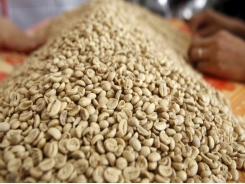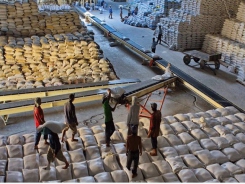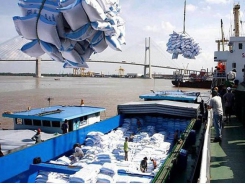Vietnams cashew industry strives to maintain the worlds top position

Despite successfully overcoming difficulties to achieve a record result of raw cashew imports and exports in 2019, there are many challenges for the cashew industry. Working together to develop and promote investment in quality is a solution to strengthen the world's number one position in exporting Vietnam’s cashew kernels.
The majority of the cashew value chain still belongs to international cashew roasters and distributors. Photo: N.H
Two new records
2019 wasconsidered a volatile year for both Vietnam’s and the world’s cashew industry. The heavy losses of previous years had a great influence in the first months of 2019. Meanwhile, the implementation and changes of some countries’ trade policies related to the operation of the cashew industry, including big countries and countries that are large partners of Vietnam’s cashew industry, have had a strong impact on the market and activities of Vietnamese cashew enterprises.
These include the US-China and the US-India trade war; the floor price for the export of raw cashew nuts in some African countries; sharp increase in the India's cashew import tax; strict regulations on the origin of goods, packaging, labelling of goods, agricultural products and food imported across borders of China; EU’s strict phytosanitary requirements for imported agricultural products; and the implementation of self-certification origin in exporting goods to the EU, Norway, Switzerland and Turkey.
In the face of such difficulties and challenges, Vietnam’s cashew industry maintained the world’s leading position in exporting cashew kernels, with the quantity of about 450,000 tonnes, earning more than US$3 billion.
Pham Van Cong, Chairman of Vinacas, said if all products exported in 2019 were combined, the turnover would reach US$3.6 billion,whichwas a new record for the cashew industry.Specifically, according to unofficial data, the output of deep-processed cashew nuts,such as fried, roasted, spiced and cashew candiesconsumed domestically and exported has grown sharply in 2019, accounting for about 15 percent of the total processed cashew nut production of the whole industry.Meanwhile, this figure was only seven to eight percent compared to the same period last year.
2019 wasalso the year that Vietnamese businesses were more proactive in supplying raw materials, as well as improving production and business efficiency. Tan Long Company, for example, has signed the biggest import contract of raw cashew in the history of the world’s cashew industry and with Tanzania and has boughtlarge quantities of raw cashew nuts from some countries. Vinacas has also gathered leading enterprises of Vietnam’s cashew industry to strengthen cooperation in production and business, regulating the supply of raw cashew nuts, initially taking the initiative in raw materials for processing, contributing to improve production and business efficiency for businesses and the whole industry.As a result, Vietnam’s cashew industry has set the second record for the amount of imported raw cashew nuts with the amount up to nearly 1.6 million tonnes, reaching an import turnover of more thanUS$2 billion.
Regarding imported raw cashew nuts, according to Cong, there have been many problems related to the quality of imported raw cashew nuts such as recovery level, moisture content, number of nuts per kilogram, amount of tailings, and impurities and problems related to food safety and hygiene as well as biological hazards such as infestation and worms. Meanwhile, the quality of imported raw cashew nuts is an important factor that decides the production and business efficiency, product quality and reputation of each Vietnamese business as well as Vietnam’s cashew industry around the world.
Therefore, Vinacas has cooperated with the Ministry of Agriculture and Rural Development, the Ministry of Science and Industry and other related industries to develop the Vietnam Standard for raw cashew nuts –namely TCVN 12380-2018 – which was approved in mid-2019. These standards are important in checking, evaluating and classifying imported raw cashew materials and handling disputes. Vinacashas applied these standards to its sales contracts with domestic and foreign partners.
Efforts to maintain the “throne”
Despite the spectacular growth after the 2017-2018 crisis, the cashew industry has faced many difficulties. Although standing in number one position in processing and exporting cashew kernels, Vietnam has mainly exported semi-processed cashew nuts at an average price of US$10 per kilogram, while the price of finished cashew kernels sold at supermarkets in countries is about US$30 per kilogram. Thus, Vietnam only accounts for one third of the cashew value chain, the remainder belongs to international roasters and distributors.
Nguyen Minh Hoai, Vice President of Vinacas, said 2020 would be an unpredictableyear due to complicated developments in the international economy, the US-China and US-India trade war; protection policies related to both raw and cashew nuts of some countries and developments in the global cashew market.India, one of the global largest markets for cashew kernels,has applied a tax policy to restrict the amount of importedcashew kernels – mainly from Vietnam – to support and restore the country's cashew industry, which has been in a crisis in recent years. China, which is considered an easygoing market, has gradually tightened the quality of imported agricultural products. Unless businesses promptly adjust to meet new requirements, it will be difficult to sendproducts to these large markets.
Big US and EU roasters said they would impose additional food safety standards and check more banned chemical residues,because their supermarkets were becoming more and more strict about food safety.European countries have also tightened regulations on origin of goods. These issues require businesses to be sensitive and adjust their plans.
In addition, according to Hoa, the lack of surveys and assessments of the market demand in 2020, as well as the failure to set output prices, are major difficulties for the cashew industry. Facing that situation, to maintain the world’s number one position in the cashew industry, Vinacas recommends businesses continuously implement a "reducing quantity and increasing quality" policy to improve the quality of cashew kernels and processing efficiency.Accordingly, it is necessary to improve machinery and equipment to enhance processing capacity and efficiency, including deep-processing.In addition, businesses need to be sensitive to market demand, especially information on supply and demand, and establish cooperation and links between large enterprisesto have specific plansin importing raw cashew nuts and supplying cashew nuts smoothly, avoiding importing raw materials at high prices and selling cashew nuts at cheap prices.
Related news
Tools

Phối trộn thức ăn chăn nuôi

Pha dung dịch thủy canh

Định mức cho tôm ăn

Phối trộn phân bón NPK

Xác định tỷ lệ tôm sống

Chuyển đổi đơn vị phân bón

Xác định công suất sục khí

Chuyển đổi đơn vị tôm

Tính diện tích nhà kính

Tính thể tích ao




 It’s a no-grainer: Time for Việt Nam to…
It’s a no-grainer: Time for Việt Nam to…  Vietnam to export rice to South Korea
Vietnam to export rice to South Korea